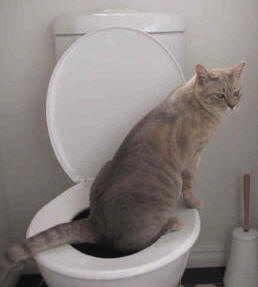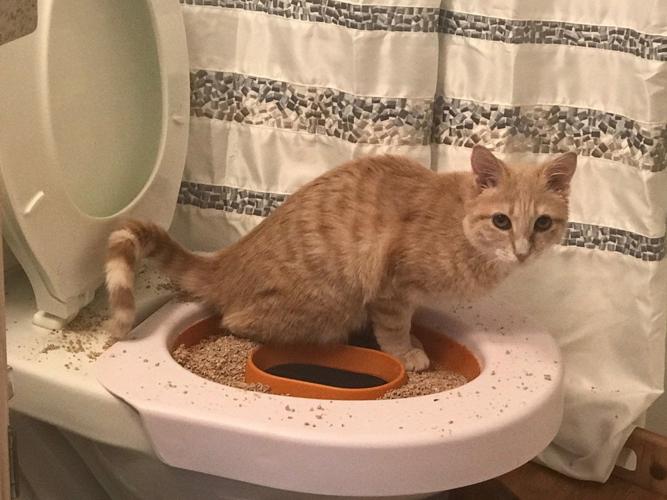Why You Should Never Flush Cat Poop Down Your Toilet - Important Facts
Why You Should Never Flush Cat Poop Down Your Toilet - Important Facts
Blog Article
We have noticed this post about How to Dispose of Cat Poop and Litter Without Plastic Bags below on the web and felt it made perfect sense to share it with you on my blog.

Introduction
As pet cat owners, it's important to bear in mind how we get rid of our feline buddies' waste. While it might seem practical to purge feline poop down the toilet, this technique can have harmful consequences for both the atmosphere and human health.
Ecological Impact
Flushing feline poop presents damaging virus and parasites right into the water supply, presenting a substantial risk to water ecosystems. These pollutants can adversely influence aquatic life and compromise water high quality.
Health and wellness Risks
Along with ecological concerns, flushing feline waste can likewise present wellness threats to human beings. Cat feces may contain Toxoplasma gondii, a parasite that can cause toxoplasmosis-- a potentially severe illness, particularly for expecting women and individuals with damaged immune systems.
Alternatives to Flushing
Luckily, there are more secure and a lot more liable ways to throw away cat poop. Consider the adhering to choices:
1. Scoop and Dispose in Trash
One of the most usual method of taking care of pet cat poop is to scoop it right into an eco-friendly bag and toss it in the garbage. Make sure to make use of a committed trash scoop and deal with the waste quickly.
2. Use Biodegradable Litter
Go with biodegradable cat clutter made from materials such as corn or wheat. These trashes are environmentally friendly and can be safely disposed of in the trash.
3. Hide in the Yard
If you have a backyard, think about hiding pet cat waste in a designated area away from veggie yards and water resources. Be sure to dig deep enough to avoid contamination of groundwater.
4. Set Up a Pet Waste Disposal System
Purchase a pet dog garbage disposal system especially designed for cat waste. These systems use enzymes to break down the waste, decreasing odor and environmental impact.
Conclusion
Liable pet dog possession expands beyond offering food and shelter-- it also entails correct waste administration. By refraining from flushing pet cat poop down the bathroom and choosing alternative disposal approaches, we can lessen our environmental impact and secure human health.
Why You Should Never Flush Cat Poop Down the Toilet
A rose by any other name might smell as sweet, but not all poop is created equal. Toilets, and our sewage systems, are designed for human excrement, not animal waste. It might seem like it couldn’t hurt to toss cat feces into the loo, but it’s not a good idea to flush cat poop in the toilet.
First and foremost, assuming your cat uses a litter box, any waste is going to have litter on it. And even the smallest amount of litter can wreak havoc on plumbing.
Over time, small amounts build up, filling up your septic system. Most litter sold today is clumping; it is made from a type of clay that hardens when it gets wet. Ever tried to scrape old clumps from the bottom of a litter box? You know just how cement-hard it can get!
Now imagine just a small clump of that stuck in your pipes. A simple de-clogger like Drano isn’t going to cut it. And that means it’s going to cost you big time to fix it.
Parasitic Contamination
Believe it or not, your healthy kitty may be harboring a nasty parasite. Only cats excrete Toxoplasma in their feces. Yet it rarely causes serious health issues in the cats that are infected. Most people will be fine too if infected. Only pregnant women and people with compromised immune systems are at risk. (If you’ve ever heard how women who are expecting are excused from litter cleaning duty, Toxoplasma is why.)
But other animals may have a problem if infected with the parasite. And human water treatment systems aren’t designed to handle it. As a result, the systems don’t remove the parasite before discharging wastewater into local waterways. Fish, shellfish, and other marine life — otters in particular — are susceptible to toxoplasma. If exposed, most will end up with brain damage and many will die.
Depending on the species of fish, they may end up on someone’s fish hook and, ultimately on someone’s dinner plate. If that someone has a chronic illness, they’re at risk.
Skip the Toilet Training
We know there are folks out there who like to toilet train their cats. And we give them props, it takes a lot of work. But thanks to the toxoplasma, it’s not a good idea.

We had been made aware of that report about Don’t flush cat feces down the toilet through a good friend on a different website. Remember to set aside a second to promote this article if you enjoyed it. I praise you for your time. Please come visit our blog back soon.
Call Today Report this page